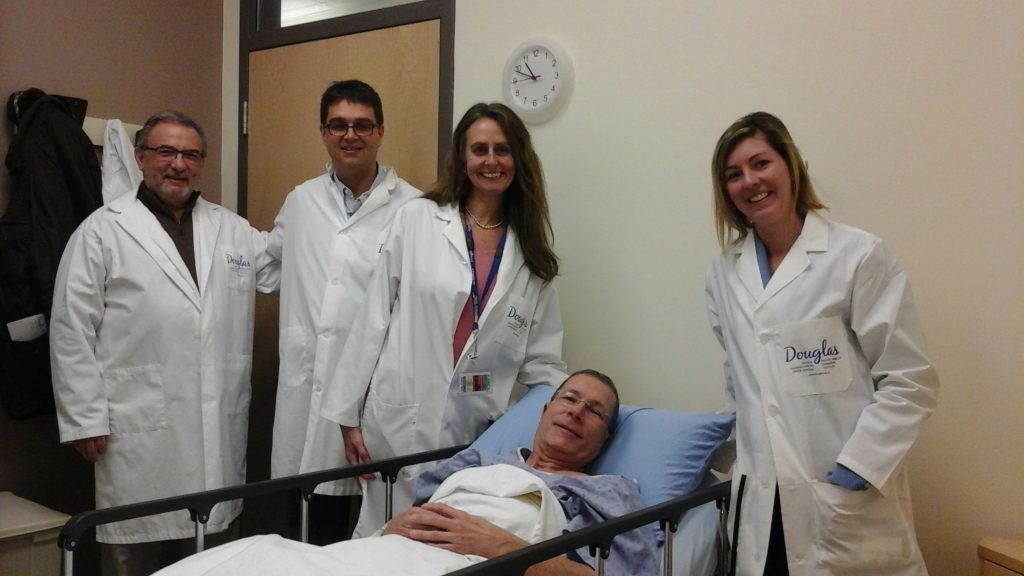John Breitner, M.D., MPH

Contact
drjcsb@mcgill.ca
6875 Boulevard LaSalle
Montréal, QC
H4H 1R3
Office:E-2212, Pavillon Perry
Office phone: (514) 761-6131 x3932
Fax: (514) 888-4060
Lab website: https://douglas.research.mcgill.ca/stop-ad-centre
Canada Research Chair in Prevention of Dementia – Tier 1
Pfizer Chair in Dementia Research
Director, Centre for Studies on Prevention of Alzheimer’s Disease (StoP-AD), Douglas Research Centre
Full Professor, Department of Psychiatry, McGill University
Lab name: Prevention of Alzheimer’s disease
Theme-Based Group: Aging, Cognition, and Alzheimer’s DiseaseDivision: Human Neuroscience
The research program of the Centre for Studies on Prevention of Alzheimer’s Disease (StoP-AD) seeks treatments that can attenuate the trajectories of a host of cognitive, chemical, neuroimaging, or sensori-neural biomarkers of pre-symptomatic Alzheimer’s disease. As of May, 2015, participants include 270 individuals who are aged 60+ and have a parental history of Alzheimer’s dementia, placing them at substantially exaggerated risk of subsequent dementia.
Current studies include:
– a two-year randomized, placebo-controlled double-masked trial of low dose naproxen sodium (N = 150)
– (in preparation) a two-year proof-of-concept trial of the cholesterol-lowering drug probucol, which is believed to induce synthesis of apolipoprotein E to mimic effects of the low-risk alleles of APOE, the major genetic risk factor for Alzheimer’s disease.
– a longitudinal cohort natural history study of the same biomarkers to identify optimal endpoints for trials of potential preventive agents
– development of methods for combining multiple independent biomarkers of pre-symptomatic Alzheimer’s disease into simple summary measures that can facilitate read-out of clinical trials in pre-symptomatic disease.
Dr. Breitner has devoted his career to investigation of factors that modify the risk of Alzheimer’s dementia (AD). Initial studies on familial aggregation used new methods to demonstrate that AD (including late-onset disease) is a strongly familial disorder. To investigate the role of genetic vs. environmental factors responsible for this familial aggregation, Dr. Breitner initiated a large, population-based twin study that is still ongoing with over 300 affected pairs now identified. The twin studies suggested a substantial adult environmental contribution to AD susceptibility, and a co-twin control study found that non-steroidal anti-inflammatory drugs (NSAIDs) were used more frequently by the unaffected member of such pairs. This finding was reproduced many times in relatively young samples (it does not seem to hold in persons older than age 80 years). Dr. Breitner therefore led efforts to conduct a large randomized trial (ADAPT) of two different NSAIDs in healthy elderly with a strong family history of AD, who were accordingly at increased risk. ADAPT encountered substantial difficulties because of safety concerns about sustained use of NSAIDs (especially newer “coxib” agents) by older people, and its treatments were therefore terminated in 2005, when most participants had been on treatment for only two years. Participants were followed closely for another 18 months, during which time ADAPT collected biosamples (including cerebrospinal fluid, or CSF) from those remaining under observation. During the follow-up interval, participants treated earlier with naproxen showed reduced incidence of AD (compared with those given placebo). They also had a biochemical profile in their CSF that suggested diminished ongoing AD neurodegenerative change. The latter observation established a precedent for the possible use of biomarkers as endpoints for intervention trials in the pre-symptomatic stages of Alzheimer’s disease. Dr. Breitner (and others) recognized the potential for this sort of research as a promising pathway to the prevention of AD.
Dr. Breitner was recruited by the Douglas Mental Health University Institute and McGill University to lead a new Centre for Studies on Prevention of Alzheimer’s Dementia (StoP-AD) at the Douglas. The Centre’s research program evaluates whether treatments can reduce cognitive, chemical, neuroimaging or sensorineural biomarkers that may track the development of Alzheimer’s disease in its pre-symptomatic stages.
Dr. Breitner has authored over 200 publications (H-index 64 per Web of Science) and is known as an outstanding teacher. He has mentored more than 15 doctoral and post-doctoral students who have gone on to hold full-time academic appointments.
Canada Research Chair in Prevention of Dementia
Pfizer Chair in Dementia Research
Fellow (emeritus), American College of Neuropsychopharmacology
Fellow, American Psychopathological Association
Dr John Breitner, Director
Dr Judes Poirier, Associate Director
Dr. Pierre Étienne, Associate Director
Dr. Sylvia Villeneuve, Collaborating Investigator
Prof. Alan Evans, Collaborating Investigator
Dr. Rick Hoge, Collaborating Investigator
Prof. Gerhard Multhaup, Collaborating Investigator
Dr. Mallar Chakravarty, Collaborating Investigator
Dr. M. Natasha Rajah, Collaborating Investigator
Dr. Pedro Rosa-Neto, Collaborating Investigator
Dr. Pierre Bellec, Collaborating Investigator (Université de Montréal)
Dr. Pierre Orban, Collaborating Investigator (Université de Montréal)
Dr Christine Lucas-Tardif, Collaborating Investigator (McGill University)
Dr Nathan Spreng, Collaborating Investigator (McGill University)
Dr. Jeannie-Marie Leoutsakos, Collaborating Investigator (Johns Hopkins)
Dr. Jason Brandt, Collaborating Investigator (Johns Hopkins)
Tremblay-Mercier Jennifer, Research Coordinator
Cécile Madjar, Associate Programmer
Justin Kat, Associate Programmer
Marie-Elyse Lafaille-Magnan, Neurology and Neurosurgery PhD Candidate
Angela Tam, PhD student in the Integrated Program in Neuroscience (co-supervised by Dr. Bellec)
Pierre-François Meyer, PhD student in the Integrated Program in Neuroscience (co-supervised by Dr. Villeneuve)
Shao H, Breitner JC, Whitmer RA, Wang J, Hayden K, Wengreen H, Corcoran C, Tschanz J, Norton M, Munger R, Welsh-Bohmer K, Zandi PP; Cache County Investigators. Hormone therapy and Alzheimer disease dementia: new findings from the Cache County Study. Neurology. 2012 Oct 30;79(18):1846-52. doi: 10.1212/WNL.0b013e318271f823. Epub 2012 Oct 24.PMID:23100399
Breitner JC, Baker LD, Montine TJ, Meinert CL, Lyketsos CG, Ashe KH, Brandt J, Craft S, Evans DE, Green RC, Ismail MS, Martin BK, Mullan MJ, Sabbagh M, Tariot PN; ADAPT Research Group. Extended results of the Alzheimer’s disease anti-inflammatory prevention trial. Alzheimers Dement. 2011 Jul;7(4):402-11.
Breitner JC, Haneuse SJ, Walker R, Dublin S, Crane PK, Gray SL, Larson EB. Risk of dementia and AD with prior exposure to NSAIDs in an elderly community-based cohort. Neurology 2009; 22:22. PMID:19386997
Sonnen JA, Montine KS, Quinn JF, Kaye JA, Breitner JC, Montine TJ. Biomarkers for cognitive impairment and dementia in elderly people. Lancet Neurol 2008;7:704-14.
Szekely CA, Green RC, Breitner JC, Østbye T, Beiser AS, Corrada MM, Dodge HH, Ganguli M, Kawas CH, Kuller LH, Psaty BM, Resnick SM, Wolf PA, Zonderman AB, Welsh-Bohmer KA, Zandi PP. No advantage of A beta 42-lowering NSAIDs for prevention of Alzheimer dementia in six pooled cohort studies. Neurology 2008; 70:2291-8.
ADAPT Research Group, Lyketsos CG, Breitner JC, Green RC, Martin BK, Meinert C, Piantadosi S, Sabbagh M. Naproxen and celecoxib do not prevent AD in early results from a randomized controlled trial. Neurology. 2007;68:1800-8. Epub 2008 May 12.
Khachaturian KS, Corcoran C, Mayer LS, Zandi PP, Breitner JC, Cache County Study Investigators. Apolipoprotein E epsilon4 count affects age at onset of Alzheimer disease, but not lifetime susceptibility: The Cache County Study. Arch Gen Psychiatry 2004;61(5):518-524.
Zandi PP, Carlson MC, Plassman BL, WelshBohmer KA, Mayer LS, Steffens DC, Breitner JCS. Hormone replacement therapy and incidence of alzheimer disease in older women – the cache county study. JAMA Journal of the American Medical Association 2002;288:2123-2129.
Miech R, Breitner J, Zandi PP, Khachaturian A, Anthony J, Mayer L. Incidence of AD may decline in the early 90s for men, later for women: The Cache County Study. Neurology 2002;58(2):209-218
Breitner JCS, Gau BA, Welsh KA, Plassman BL, McDonald WM, Helms MJ, et al. Inverse association of anti-inflammatory treatments and Alzheimer’s disease: initial results of a co-twin control study. Neurology 1994;44:227-232.
Mohs RC, Breitner JC, Silverman JM, Davis KL. Alzheimer’s disease: morbid risk among first degree relatives approximates 50% by 90 years of age. Archives of General Psychiatry 1987;44:405-408.
Breitner JCS, Murphy EA, Folstein MF. Familial aggregation in Alzheimer dementia II: clinical genetic implications of age-dependent onset. Journal of Psychiatric Research 1986;20:45-55.
Breitner JCS, Folstein MF. Familial Alzheimer dementia: a prevalent disorder with specific clinical features. Psychological Medicine 1984;14:63-80.



